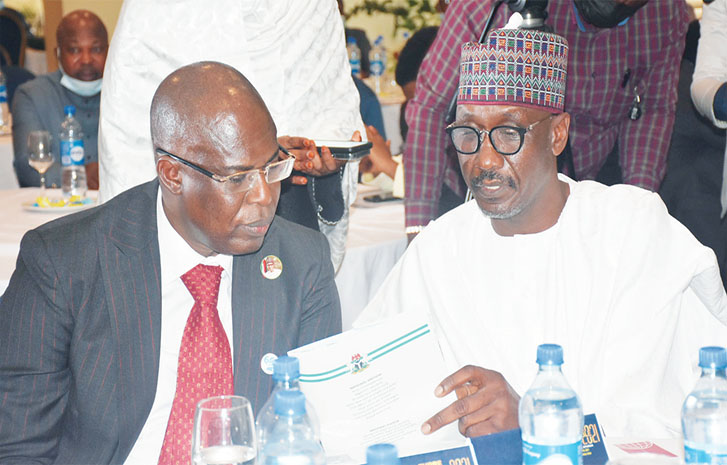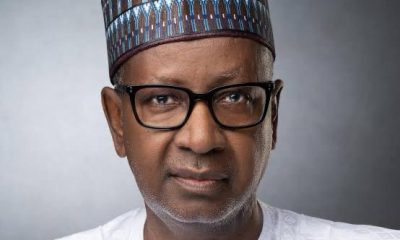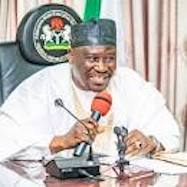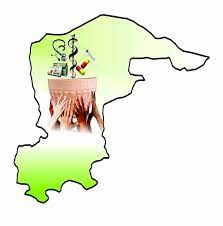Oil & Gas
NNPC Weekly Review: Stakeholders Hail PIA as Economic Game-Changer

The Nigerian National Petroleum Company Limited (NNPC) started the week with the commendation of stakeholders in the nation’s political and industrial sectors on the successful activation of the Petroleum Industry Act (PIA 2021).
It would be recalled that the Act was signed into law by President Muhammadu Buhari on Aug.
16, as an economic game-changer.The stakeholders who include the Governor of Akwa Ibom State, Mr Udom Emmanuel, the Chief Executive Officer (CEO) of NNPC, Malam Mele Kyari, and former Managing Director of Seplat Petroleum Mr Austin Avuru, gave the commendation at the just concluded 27th Nigerian Economic Summit (NES).
The summit was a public-private sector dialogue organised by the Nigerian Economic Summit Group (NESG).
In a virtual presentation, Gov. Emmanuel applauded President Buhari’s timely assent to the PIA, saying that the law has given a sense of belonging to all stakeholders, especially the host communities.
The Governor who was represented by the Secretary to the State Government (SSG), Dr Emmanuel Ekuwem, said that the provisions regarding frontier exploration would help revisit the oil wells that had been capped and would improve the state’s economy.
On his part, the former Managing Director of Seplat Petroleum, Mr. Austin Avuru, said the PIA would change NNPC’s mode of operations as it had empowered the Company to do business according to rules rather than discretion.
He further noted that NNPC operating under the Company and Allied Matters Act (CAMA) would strengthen the petroleum industry.
In his presentation titled: “PIA 2021 Is a New Day”, the CEO of NNPC, Malam Mele Kyari, gave an overview of the structure of the new NNPC Limited as provided in the PIA.
Kyari who was represented by the Chief Financial Officer of the Company, Mr Umar Ajiya, said that according to the PIA, NNPC would operate under CAMA, declare dividends to its shareholders and retain 20 per cent of its profits to grow its businesses.
The PIA was enacted to provide legal, governance, regulatory and fiscal frameworks as well as provide guidelines for the development of host communities and other related matters in the upstream, midstream and downstream sectors of the Nigerian Petroleum Industry.
The Act is made up of five Chapters, 319 Sections, and 8 Schedules.
Still in the week under review, the NNPC said the country’s petroleum product demand would expectedly grow by 14.57 per cent to 17.3million metric tons by 2025 from 15.1million metric tons in 2020.
This projection was made by the company’s CEO, Mele Kyari, at the opening of the 15th Oil Trading and Logistics (OTL) Africa Downstream Week which took place in Lagos.
In a keynote address at the event, Kyari disclosed that the country required about 3.097billion dollars worth of investment in condensate refineries to meet the projected demand for petroleum products.
According to Kyari who was represented by the Group Executive Director, Downstream, NNPC, Engr. Adeyemi Adetunji, the NNPC requires between 1.6billion dollars and 2.7billion dollars to improve the supply and distribution of petroleum products, revamp Liquefied Petroleum Gas (LPG) infrastructure, and build Compressed Natural Gas (CNG) plants in the country.
Speaking on the theme of the conference “Downstream in Transition: Getting Set”, the NNPC helmsman said that the country would need a refining capacity of about 1.52million barrels per stream day (MBPSD) to meet its petrol requirement in the next four years.
He also projected that the demand for natural gas could grow about four times over the next decade from 4.8billion cubic feet per day (bcf/d) in 2020 to between 10 and 23bcf/d in 2030.
He said that the current supply to the domestic market was about 8bcf/d to power, 0.77bcf/d to industries, and 3.2bcf/d for export through the LNG and the West Africa Gas Pipeline (WAGP), while about 54bcf/d was flared.
According to him, the expected demand growth would come from the increase in the wheeling capacity of existing national power grid in line with the Presidential Power Initiative, major fertilizer projects (Dangote, Brass), and industrial demand for natural gas in the northern axis of the country.
On the global oil market outlook, Kyari said: “Some 10.4trillion dollars global stimulus in response to the COVID-19 pandemic led to the rebound in consumers’ spending while incentives for long-term investments in hydrocarbon had waned.”
Quoting the recent data by the Organisation of Petroleum Exporting Countries (OPEC), Kyari stated that hydrocarbon would continue to be relevant in the global energy mix for the next two decades.
He slao quoted OPEC date saying that the world oil demand is expected to rise from a pandemic stricken 90.6million barrels per day (mbpd) in 2020 to 108.2mbpd in 2045, thereby accounting for 28 per cent of global energy needs.
The OPEC data further stated that the rise in demand would be driven by growth in world population, which is set to expand to 9.5 billion by 2045, and the huge potential for expanding access to modern energy services for the under-served.
He noted that the downstream sector of Nigerian oil and gas industry had been in transition prior to the passage of the PIA.
This he said, was in response to the global energy transition and decarbonisation initiatives.
Kyari maintained that it would be difficult to discuss the transition in the downstream sub-sector in isolation from the overall evolution that is happening in the industry, adding that NNPC had diversified its portfolio over the years towards transiting to an energy company with new investments in gas, power, and renewables.
He said that key pipeline projects were on-going to assure delivery of gas to the demand nodes, stressing that the corporation has also progressed with the Refineries Rehabilitation Programme to enhance its participation in the Oil and Gas value chain.
Kyari explained that the transition in Nigeria’s oil and gas sector was being driven by the global decarbonisation efforts to switch to renewables in response to environmental concerns.
As investments in hydrocarbon continued to wane due to energy transition and geopolitics, Kyari said the world economy faced shortages, high energy prices, rising inflation and sluggish growth.
Meanwhile, the NNPC has revealed the cost of the 21 road it plans to rehabilitate under the Federal Government Road Infrastructure Development and Refurbishment Investment Tax Credit Scheme in pursuant to Presidential Executive Order 007 of 2019.
Following the approval by the Federal Executive Council (FEC), the NNPC would construct a total of 1,804.6km of roads at a total cost of N621,237,143,897.35 (Six Hundred & Twenty-One Billion, Two Hundred & Thirty Seven Million, One Hundred & Forty Three Thousand, Eight Hundred & Ninety Seven Naira, Thirty Five Kobo).
The breakdown is as shown below in a statement issued by Mr Garba Deen Muhammad, Group General Manager, Group Public Affairs Division of the NNPC.
| S/No | ZONE | KMs TO BE COVERED | COST (BILLION NAIRA) |
| 1. | North Central | 791.10 | 244,872,518,149.29 |
| 2. | North East | 273.35 | 56,126,741,692.11 |
| 3. | North West | 283.5 | 23,057,338,426.61 |
| 4. | South East | 122.0 | 43,281,895,080.04 |
| 5. | South South | 81.9 | 172,027,737,903.32 |
| 6. | South West | 252.7 | 81,870,912,645.98 |
| Total | 6 Zones | 1,804.6km | N621,237,143,897.35 |
NEWS
NGEP Urges Gas Reticulation In Buildings

By Olasunkanmi Onifade
Abuja, April 29, 2025 The National Gas Expansion Programme (NGEP) has called on stakeholders to promote the integration of gas reticulation systems in estates, districts, and industrial areas, following best practices seen in developed countries.
Chairman of NGEP, Prof.
Mohammed Ibrahim, made the call on Tuesday during the Builders’ Conference and Annual General Meeting of the Nigerian Institute of Building (NIOB), FCT Chapter, in Abuja.The conference, themed “Gas Reticulation in Building: Design, Safety, Environmental Compliance and Prospects for Builders,” focused on enhancing energy infrastructure in Nigeria’s built environment.
Ibrahim noted that with Nigeria’s vast natural gas reserves, gas reticulation offered a sustainable solution to improve energy accessibility, affordability, and reliability in homes and businesses.
“Gas reticulation in buildings presents a compelling pathway to a more sustainable, efficient, and resilient built environment.
“By prioritising sound design principles and ensuring strict adherence to safety and environmental standards, we can unlock the full potential of natural gas to drive progress,” he said.
He highlighted the key benefits of gas reticulation, including energy efficiency, cost effectiveness, versatility, and reliability.
Also speaking, the Chairman of the Council of Registered Builders of Nigeria, Samson Opaluwah, stressed the importance of capacity building for safe and efficient gas distribution.
He said this involved training engineers, technicians, and other professionals in system design, installation, and maintenance, while also strengthening regulatory frameworks and encouraging local innovation and manufacturing.
The Chairman of NIOB, FCT Chapter, Usman Okehi, emphasised the growing need to incorporate gas systems in residential, commercial, and industrial developments across Nigeria due to rising energy demands and gas availability.
According to him, with this advancement comes the need for strict adherence to design standards, rigorous safety protocols, and full environmental compliance.
“It is our responsibility as professionals and regulators to ensure these systems are functional, safe, and environmentally sound,” Okehi said.
He described the conference as a platform where stakeholders could explore the evolving landscape of gas infrastructure in building projects, share best practices, examine safety and environmental considerations, and assess future opportunities for builders in the sector.
The News Agency of Nigeria (NAN) reports that the Nigerian Institute of Building is the professional body for builders in Nigeria. It traces its origins to the Builders’ Society, established in London in 1834.
Oil & Gas
FG Inaugurates Committee to Enhance Gas Distribution in Urban Buildings

The Ministry of Petroleum Resources has inaugurated a Technical Working Group to enhance gas reticulation practices in Nigeria’s building industry.
The ministry’s Permanent Secretary, Amb. Nicholas Ella inaugurated the Technical Working Group (TWG) between the National Gas Expansion Programme (NGEP) and the Council of Registered Builders of Nigeria (CORBON) on Wednesday.
Reports= says that reticulation refers to the process of creating a network of pipes or tubes to distribute gas or other utilities to buildings or industrial sites.
The permanent secretary restated the importance of creating energy smart cities, saying that modern urban development relies on efficient gas and utility distribution systems,
“Most modern cities in developed countries have evolved to energy smart cities where energy, specifically gas and other utilities are piped to districts and estates.
“However, one of the key tools in creating energy smart city is the National Building
Code which, in essence, sets the guidelines on Building Pre-design, designs, construction and post-construction stages,” he said.
The permanent secretary reiterated the benefits of reticulated gas systems for households and businesses alike, adding that it ensured metered supply akin to water and electricity,
According to him, it eliminates the need for cumbersome refills, and also enhances safety by burying pipes and incorporating advanced safety equipments.
“The TWG is tasked with designing a comprehensive policy to implement best practices for gas reticulation using LPG, PNG, and Bio-Gas across Nigeria’s building sector.
“Key responsibilities include reviewing the current National Building Code, examining global gas distribution systems, and proposing quality standards for materials used in gas installations,” he said.
The permanent secretary emphasised the need for rigorous safety protocols and guidelines to ensure the efficient and safe use of gas in construction.
He urged the group to prioritise environmental sustainability in its recommendations, adding that the group is expected to submit its report by Nov. 15.
Earlier, Mr Samson Opaliwah, the Chairman of CORBON. expressed the council’s commitment to collaborate with the group to ensure safe uptake of gas for use in houses and housing estates in Nigeria.
“I assure you of the williness of CORBON to leverage the expertise and resources at her disposal to ensure that steps are put in place for gas infrastructure in buildings and estates.
“The gas infrastructure will be safe, sustainable and world-class.
” Our collective efforts will yield clear, standardised guidelines for safe and effective gas systems in buildings, matched with a skilled workforce to meet growing demands in Nigeria,” he said. (NAN)
Oil & Gas
Utilise Oil, Gas Industry Report as Tool for Public Debate – NEITI

The Nigeria Extractive Industries Transparency Initiative (NEITI) has urged stakeholders to utilise its 2022/2023 oil and gas report for civic engagement, constructive dialogue, and public debate.
Executive Secretary of NEITI, Dr Orji Ogbonnaya Orji, made the call at the report’s public presentation on Thursday in Abuja.
The report was unveiled by Mr Ola Olukoyede, Chairman, Economic and Financial Crimes Commission (EFCC), alongside Sen.
George Akume, Secretary to the Government of the Federation and Chairman, NSWG, NEITI and other dignitaries.Orji emphasised the report’s significance in guiding policy, encouraging public debate, and improving governance in natural resource management.
He highlighted the report’s comprehensive data on revenues, governance structures, operations, and compliance within the oil and gas sector.
Speaking at the public presentation of the report, Akume reaffirmed the Federal Government’s commitment to transparency principles.
Olukoyede pledged to investigate the report’s findings and recommendations, noting that NEITI’s previous reports led to the recovery of over N1 billion.
The report is available on NEITI’s website, providing valuable insights into the sector’s performance and challenges.
The presentation was attended by Chairmen of National Assembly Committees, captains of industries, members of diplomatic missions, development partners, civil society organisations and the media. (NAN)

























